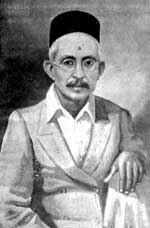 12 January, 1977
12 January, 1977
GM (Ganesh Man Singh) reminds me that we have returned to Nepal as captains of the ship (that is Nepal). The ship, according to our calculation and for everybody to see, is sinking. We have rushed to its rescue, and in case it has to sink, we will not have our place and run for safety, but will go down with it. If the other party, (ie the King who is captain today and whose piloting is responsible for the ship being in the present stormy sea and predicament) doesn't in its senses yield to our piloting, and doesn't permit us in its calculation then Nepal as a state and nation will be obliterated from the map and we patriots will also perish in this national obliteration. Therefore we should not unnecessarily brood over as to whether King (King Birendra) will see us and discuss things with us or whether this thing would happen or that; If he doesn't, everything is lost.
We shouldn't calculate the loss because the loss is total and cataclysmic. We should rather think over the points that may come up for discussion with the King and what steps, immediate and long range. We should take to affect remedial and permanent results, in case the talk with the King is successful. GM prepares tea, both in the early morning and afternoon, and during these hours we discuss politics.
We again asked for a doctor and a dentist, the Major also feels helpless. He says that he has repeatedly sent word to the army HQ that we are asking for a doctor everyday in the morning. He himself doesn't know why this delay. He has asked us to speak to the general who would be coming to the camp to supervise the interviews on Saturday (is 2nd of Magh). We think that it is in keeping with the policy of keeping us incommunicado that the doctors are not sent. But if the interviews are granted then our analyses with regard to our solitary confinement proves wrong.
I did some washing, took a bath- my second bath after I arrived here. I rub oil, stay in the sun for some time and when I am sufficiently warm I rush to the bath room, stand under the running tap, rub my body briskly, stand under the running tap once again before I rub off with the wet and rough towel and return to the room with the tingling sensation of health. The water is so cold that it beats like a hammer on the back of the head unless you know how quickly to remove your head from the running water. Even after that for some time the head aches. Perhaps it is nature warning that enough is enough.
13 January, 1977
Having nothing better to do I started leafing Rishikesh Shah's "An Introduction to Nepal" which GM had bought. It is not a substantial book, and Shah himself was a little apologetic about it, saying that it was written for one who had no idea about Nepal-for some foreigner who wouldn't know facts about it-in a hurry. I read the chapter dealing with the Shah period, Prithvi N Shah and the coming of Jangabahadur. The story is replete with court intrigues, murders, chicanery, betrayals and machination of our ambitious queens, the most numerous of the protagonists. Shah has not written a word about how they administered the country. In a country that has a monarchy of such tradition the unbridled royal power is a menace. I don't know how far culture and modern political spirit is imbibed by present incumbent whose ancestral legacy is dripping with horror. Will the modern prevail over the medieval in the palace atmosphere? Will the modern prevail over the medieval in the formulation of state policy? Royal vs the People; the Palace vs the country? That is the question whose answer one way or the other will divide the fate of Nepal one way or the other.
When my father died in prison in 1945, he was most probably 66 years old, my mother was probably 48 years. I was 30 years and something- Bunu, our youngest sister was 13. I am now 62 years and a half. Sushila, 10 years my junior is 52, Prakash 30 years and 4 months, and my youngest Chetna is 17 years and a half. This idea of death, a macabre imagination induced perhaps by jail condition where one doesn't know when and if one would be relieved sometimes crosses my mind and that father had died in the Rana prison puts into me the idea of my own death in prison. After that a chain reaction starts in my mind - Mother, Sushila, myself, Prakash, Bunu and Chetna. I also know that time is on our side. Therefore I have to live. If father had survived even for a year, he would was witnessed the tremendous transformation in the political scene of the Indian Sub-Continent. Judha SS would have abdicated, Padma SS would have been the PM. In India, the British would have been gone. Did father have the slightest inkling of the coming events of such earthshaking dimensions? I have to live. I don't have to be told by astrologers, some of whom have predicted a bright future for me provided my health doesn't betray me that ultimately I will triumph, our cause will win, the people will prevail, - I will see myself all this happening.


